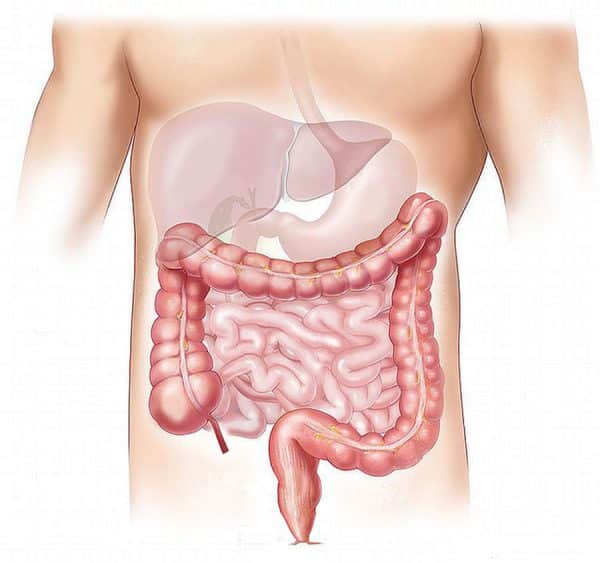Intestinal diagnostics – Intestinal function test

Intestinal diagnostics at the THERA Praxisklinik
- Flora status (microbiological analysis of aerobic and anaerobic microorganisms, moulds, yeasts (Candida albicans and Candida spp.)
- Digestive residues in the stool (e.g. undigested fat or protein)
- Possible causes of maldigestion (pancreatic elastase, bile acids)
- impaired nutrient absorption, e.g. inflammation, barrier disorder (alpha-1-antitrypsin, calprotectin)
- immunological mucosal defence, immunirritation (sIgA)
- Test for food intolerances (ProImmun M / Alcat leucocyte activation test)
- Histamine intolerance and mast cell activation syndrome
- Lactose/fructose intolerance
The intestine not only plays a central role in the utilisation of food and the elimination of waste products, but also has two other important tasks:
It contains our enteric nervous system (the so-called “gut brain”) with over 100 million nerve cells, is involved in the production of hormones (including serotonin and dopamine) and therefore has an influence on mood and skin appearance (“mirror of the soul”).
The gut can also be described as the root of our immune system, as around 80% of all immune cells are located in the gut (in the so-called Peyer’s plaques) or are trained there for their tasks in the organism.
Laboratory analysis
We work with detailed laboratory tests of blood and stool values, thanks to which we can make very good statements about the functionality of the intestines. For example, a malfunction of the intestine (often caused by malnutrition, stress or environmental pollution) can lead to so-called “leaky gut syndrome”. In this disease, the macroscopic connecting bridges between the individual cells of the intestinal mucosa become larger and larger due to chronic inflammatory stimuli.
As a result, ever larger molecules of undigested food components find their way into the organism, triggering strong immunological reactions. Normally, a healthy intestine prevents this if the mucosal barrier is fully functional. Suitable laboratory tests of the faeces can usually provide precise information on this. Blood tests can often also determine whether the causes of illnesses can be found in the intestine.
Immunological deviations very often have their origin in a disturbed intestinal function. There are suitable markers for the intestine that give us indications as to whether the metabolism there is out of balance and whether there may be a risk of developing intestinal cancer in the future. There are many known causes of impaired bowel function, which can have a variety of effects.
Colonoscopy
Gastroscopy and colonoscopy are standard in gastrointestinal diagnostics. In the hands of a good and experienced gastroenterologist, we consider these two examinations to be quite harmless and they are extremely important in order to gain an overview of the “local anatomy”. Polyps, inflammations and even cancers of the stomach/intestines can be detected with a high degree of certainty by such an endoscopy.
Unfortunately, a gastroscopy or colonoscopy rarely clarifies functional intestinal complaints, as these methods have their limitations. Patients with functional bowel problems in particular often have a long path of suffering. With the diagnosis of so-called irritable bowel syndrome, the only remaining therapeutic approach is psychosomatics. However, knowledge about functional intestinal disorders has been known for a long time, and the work of F. X. Mayr and other therapists has provided very good insights here.
Diseases associated with disorders of bowel function
We attach great importance to the diagnosis and treatment of intestinal dysfunction. For us, the possible connection between a disturbed intestinal function/flora and the occurrence of diseases is very important. Appropriate treatment of the real causes of intestinal dysfunction very often and quickly leads to significant improvements.
Intestinal diagnostics in our practice is particularly useful for the following disorders in order to recognise correlations:
Intestinal/digestive complaints:
- functional, i.e. impairments or complaints without the need for pathological findings
- infectious (diarrhoea caused by bacteria, parasites or viruses)
- chronic inflammatory (diverticulitis, Crohn’s disease, ulcerative colitis)
- anatomical
- immunological
- as a result of therapies
Complaints outside the intestine:
- Urinary tract infections
- Fungal diseases of the female genital organs (vulvovaginal mycosis)
- liver diseases (e.g. hepatic encephalopathy)
- disturbed immune reactions, autoimmune diseases, etc.
- Skin diseases (neurodermatitis, psoriasis, acne)
- Fatigue syndrome, concentration disorders, depression
- Joint diseases (arthrosis, arthritis)
- Diseases of the lungs
- Obesity or malnutrition
“The gods have placed the diagnosis before every therapy, but every diagnosis remains gossip as long as it does not help therapeutically”
– old medical wisdom –
Your contact persons
Contact and appointment possible at any time
Do one or more of the above points apply to you and would you like to do something for your health? Are you curious? Please feel free to contact us by phone to make an appointment.
You can reach us according to our opening hours at tel. 030 79016533. We look forward to your call or message.











